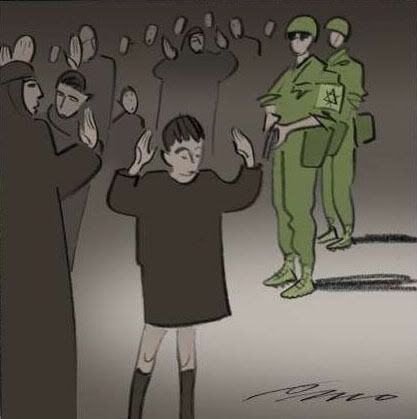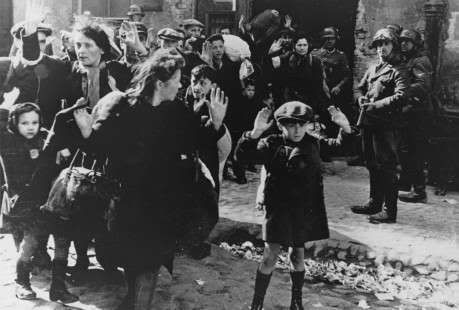Freedom of expression is once again on the agenda in Denmark. The country received world attention when the rightist newspaper Jyllands-Posten published provocative cartoons of the Prophet Muhammad a few years ago. The cartoons caused widespread protests in the Muslim world, whereas discussions in Denmark and other Western countries revolved around freedom of the press.
 
|
This time, a new cartoon controversy was set off by the liberal daily Politiken. The paper’s cartoonist Per Marquard Otzen published a cartoon that depicts Israeli soldiers’ behavior in the attack on the Gaza Ghetto by drawing upon a 1943 photograph of Nazi persecution of Jewish women and children in the Warsaw Ghetto.
In an open letter of protest to the editors of the paper, Finn Schwartz, a leader of the Jewish community, asked: “Does Politiken really think, as the cartoon implies, that the relation between Israel and Hamas is comparable to that between Hitler’s Germany and European Jews?” The letter expressed pain and anger at the message of the cartoon: “For the Jewish community, especially for the Jews who survived the Holocaust, it is inconceivable to make such comparisons between the Israeli army’s conduct and the Nazis’ attempt at the final solution [Endlosung] of the Jewish people.”
In his reply, Politiken editor-in-chief Toger Seidenfaden says that such a comparison is indeed inappropriate in his opinion and would never appear in an editorial of the paper. But he also makes it clear that he doesn’t believe the cartoon to be so crude that it should not have been published at all. Nor does he regard a debatable and disproportionate historical comparison as equivalent to anti-Semitism. Furthermore, he points out the fact that most major newspapers in the world have in fact published similar comparisons.
It should be recalled that there has always been a strong pro-Israel public opinion in Denmark since the proclamation of the Jewish state. However, the war on Gaza has created a shift, which can be also observed within the political class. At a relatively large Copenhagen demonstration against Israel’s war on January 13, all parties of the opposition (from the center left to the extreme left) had their leading members speak to the 6,000-7,000 people assembled at City Hall Square and in front of the Danish Parliament.
A similar evolution is visible elsewhere on the continent. There has been much unease in Europe about the scope of Israel’s military response and the resulting civilian casualties. Event though the “politically correct” position is still that Israel, like any other country, has the right to defend itself, questions about proportions and consequences for civilians are giving rise to debates on the Israeli policy toward the occupied territories, which are in turn creating a new awareness of the Israel-Palestine problem. The mantle of Jewish victimhood, which has long served to cover Israel’s occupation in Palestine and its attacks on its Arab neighbors, is in the process of being frayed by Israel’s own warfare on a defenseless population.
Israel has lost carte blanche, and that is a positive development. On the other hand, there is also a negative development: there have been attacks on individual Jews and Jewish symbols in most European countries, raising fears of new anti-Semitism. The promise of Zionism that the creation of a Jewish state would bring safety and security to world Jewry has proven to be an illusion. The tragic irony of modern Jewish history is that anti-Semitism may become reinvigorated, or more accurately a new variety of it may grow, as a reaction against the Zionist project. An increasing number of Jews, especially in the diaspora, are aware of this danger. One of the questions raised by Israel’s latest war is what form Jewish responses to Zionism, as well as to shifting public opinions about Israel, will take.
Jacques Hersh is professor emeritus of Aalborg University, Denmark and former head of the Research Center on Development and International Relations there.
